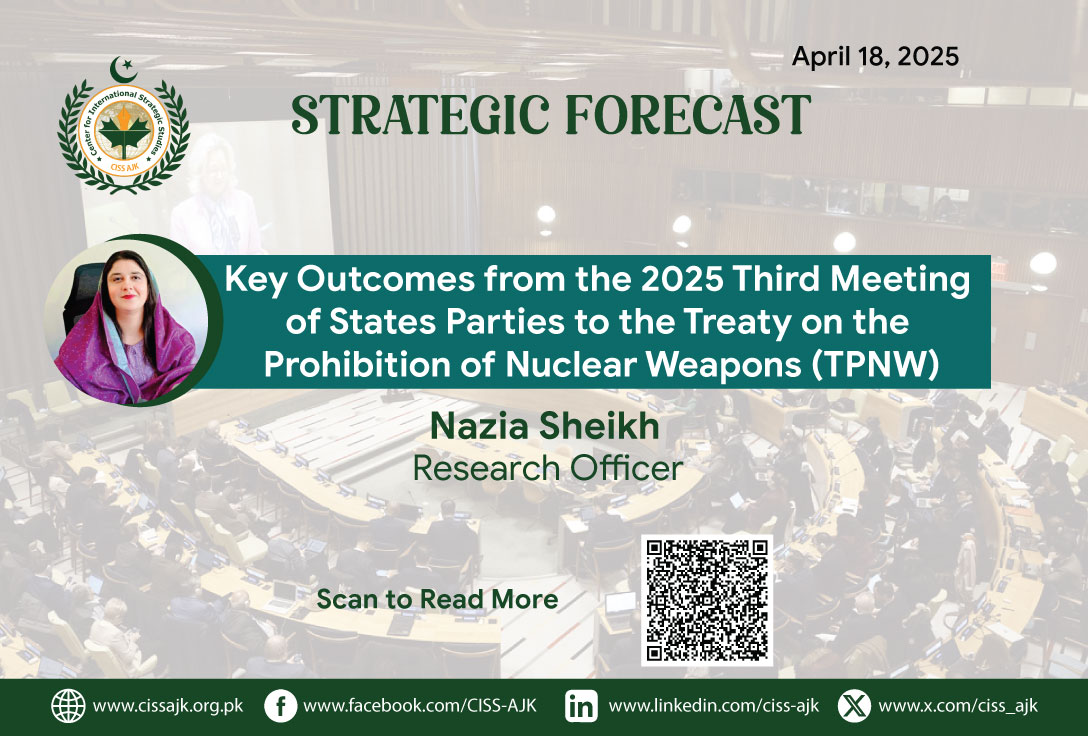The TPNW is the first international legislative body to forbid nuclear weapons completely. TPNW offers a crucial forum for promoting disarmament worldwide. The Treaty has 94 signatories and 73 ratifications since it entered into force in 2021. The first Meeting of States Parties on TPNW was held in Vienna from June 21-23, 2022, and the second was held from 27 November to 1 December 2023, at the United Nations Headquarters in New York. Following the 3rd meeting conducted on March 3-7, 2025, eighty-six nations attended the Third Meeting of States Parties (3MSP) to the UN TPNW, which took place in the UN Headquarter. The meeting was concluded successfully with a political declaration and a set of conclusions adopted by the participants.
Promoting the 50-point Vienna Action Plan, which was approved at the 2022 First Meeting of States Parties, was one of the main priorities in the 2025 meeting. The action plan’s objectives were to verify nuclear disarmament, universalize the TPNW, and create a trust fund to support victims of nuclear weapons testing and usage. This resulted in the creation of a Scientific Advisory Group and Coordinating Committee and an intersessional structure with thematic informal working groups facilitated by co-chairs and facilitators. These initiatives were further strengthened during 2MSP in 2023. 3MSP was also expected to question nuclear deterrence measures. It was anticipated that 3MSP would expand this work, especially since the Second Meeting of States Parties for the first time established that the international community must change its focus to addressing nuclear deterrence narratives by highlighting the dangers and humanitarian effects of nuclear weapons, participating nations aimed to challenge the prevailing security assumptions that support the presence of nuclear arsenals.
The 2025 meeting ended with several important outcomes highlighting the threat that nuclear weapons pose to global society. With the statement that “Nuclear deterrence is posited on the existence of nuclear risk, which threatens the survival of all,” a significant result was the ratification of a strong political declaration opposing the use of atomic weapons as a military deterrent. The declaration emphasized the worldwide threat posed by nuclear weapons and the need for all signatories to take steps towards the “global public good” of a nuclear-weapons-free world.
The state parties also reached a comprehensive set of resolutions to improve the TPNW’s implementation and adopted a political declaration. These actions, the creation of verification systems, and tighter coordination with other global disarmament programs were initiatives to encourage other states to join TPNW. As the first TPNW review conference is also scheduled for November 30-December 4, 2026, the dedication to a robust intersessional procedure guarantees that advancements will continue further.
Another important outcome of 3MSP was including a diverse range of opinions to expand the TPNW’s reach. The meeting also resulted in the inclusion of perspectives from nuclear-affected areas. Different events were hosted to address the threat of nuclear weapons through the universalization of the TPNW provided by the Nuclear Bank Week, affiliated with the 3MSP. One of the events held during Nuclear Ban Week, the Nuclear Survivors Forum, brought together survivors of Nagasaki and Hiroshima to discuss the humanitarian effects of nuclear weapons usage while stressing the urgent need for global disarmament through the TPNW.
The presentation of a new working paper by the Scientific Advisory Group was also a key highlight of the meeting. This paper underlined the catastrophic effects of nuclear deterrence while offering specific recommendations on how TPNW governments can successfully counter nuclear weapons policies. The scientific findings of the paper concluded with the statement that total nuclear disarmament is the only method of ensuring the security of all states.
The TPNW’s Third Meeting of States Parties concluded to strengthen international pressure to abolish nuclear weapons by expanding the universality of the TPNW. The momentum from the 3MSP is an urgent reminder that nuclear weapons are not a security assurance but an existential threat that must be eradicated as the world prepares for the first TPNW Review Conference in 2026. 3MSP also reiterated that states work together to achieve a world free of nuclear weapons in the future. States also agreed to continue to work on the 50-point Vienna Action Plan to take stock of progress and prepare the next series of actions at the Review Conference.
Pakistan is a persistent objector to the TPNW as it lacks inclusivity, collaboration and absence of a security-based approach to disarmament. This Treaty neither formulates a part nor contributes to the development of customary international law in any way. Pakistan has consistently advocated for test bans and has even implemented a unilateral testing moratorium. Pakistan’s concerns about the Treaty include that it does not “account for vital security considerations of each state” and that none of the states with nuclear weapons participated in its meetings.
Author
Nazia Sheikh, Research Officer at Center for International Strategic Studies AJK.

